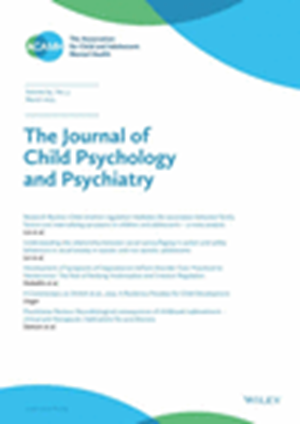揭示性少数群体的精神病风险:青春期社会失败和怀疑的时间动态。
IF 7
1区 医学
Q1 PSYCHIATRY
引用次数: 0
摘要
之前的研究表明,性少数群体患精神病的风险更高,可能是由于反复的社会失败经历。然而,调查这一假设的实证研究在很大程度上是缺乏的。本研究考察了“感觉被排斥”和“不属于”的经历如何影响青少年性少数群体精神病经历的未来发展,这里定义为对他人的非异性恋吸引力。方法采用经验抽样法(ESM)对1913例11 ~ 20岁佛兰德青少年的SIGMA研究数据进行分析。他们报告了独处时的短暂排斥感,和其他人在一起时的归属感(都是社会失败的操作化),以及怀疑感。多水平线性回归模型检验了社会失败与怀疑之间的双向、内部和人与人之间的联系,以及性少数地位的影响。结果:与同伴在一起时,较低的归属感显著预示着下一次蜂鸣声时较高的疑心[95% CI: -0.03, -0.01],而独自一人时,较高的排斥感则无此影响。此外,怀疑并不能显著预测下一次哔哔声时的排斥感和归属感,证实了效应的方向。性少数参与者普遍报告在社会环境中较低的归属感[95% CI: -0.68, -0.29]和较高的怀疑[95% CI: 0.16, 0.57],但没有较高的排斥感。社会失败与性少数身份之间的交互作用不显著,表明对社会失败经历的敏感性不存在差异。结论与人交往时的“不适应”体验可能是增加性少数青少年精神病经历风险的最尖锐的社会因素。研究结果强调,需要一个包容的环境,让性少数群体感到得到支持和融入。本文章由计算机程序翻译,如有差异,请以英文原文为准。
Unraveling psychosis risk in sexual minorities: temporal dynamics of social defeat and suspiciousness in adolescence.
BACKGROUND
Previous research suggests that sexual minorities are at higher risk for psychotic experiences, possibly due to repeated social defeat experiences. However, empirical research investigating this hypothesis is largely lacking. This study examined how experiences of "feeling excluded" and "not belonging" impact the prospective development of psychotic experiences in an adolescent sexual minority group, defined here as non-heterosexual attraction to others.
METHODS
Experience sampling method (ESM) data from 1913 Flemish adolescents (aged 11-20) in the SIGMA study were analyzed. They reported their momentary feelings of exclusion when alone, belonging when in the company of others (both operationalizations of social defeat), and suspiciousness. Multilevel linear regression models tested the bidirectional, within- and between-person associations between social defeat and suspiciousness, and the effects of sexual minority status.
RESULTS
Lower feelings of belonging when in company significantly predicted higher suspiciousness at the next beep [95% CI: -0.03, -0.01], whereas increased feelings of exclusion when alone did not. Moreover, suspiciousness did not significantly predict feelings of exclusion and belonging at the next beep, confirming the direction of effect. Sexual minority participants reported generally lower belonging in social settings [95% CI: -0.68, -0.29] and higher suspiciousness [95% CI: 0.16, 0.57], but not higher feelings of exclusion. The interaction between social defeat and sexual minority status was not significant, indicating no differential sensitivity to social defeat experiences.
CONCLUSIONS
The experience of "not fitting in" when in company may be the most poignant social factor increasing risk for psychotic experiences in sexual minority youth. The findings highlight the need for inclusive environments where sexual minority individuals feel supported and integrated.
求助全文
通过发布文献求助,成功后即可免费获取论文全文。
去求助
来源期刊
CiteScore
13.80
自引率
5.30%
发文量
169
审稿时长
1 months
期刊介绍:
The Journal of Child Psychology and Psychiatry (JCPP) is a highly regarded international publication that focuses on the fields of child and adolescent psychology and psychiatry. It is recognized for publishing top-tier, clinically relevant research across various disciplines related to these areas. JCPP has a broad global readership and covers a diverse range of topics, including:
Epidemiology: Studies on the prevalence and distribution of mental health issues in children and adolescents.
Diagnosis: Research on the identification and classification of childhood disorders.
Treatments: Psychotherapeutic and psychopharmacological interventions for child and adolescent mental health.
Behavior and Cognition: Studies on the behavioral and cognitive aspects of childhood disorders.
Neuroscience and Neurobiology: Research on the neural and biological underpinnings of child mental health.
Genetics: Genetic factors contributing to the development of childhood disorders.
JCPP serves as a platform for integrating empirical research, clinical studies, and high-quality reviews from diverse perspectives, theoretical viewpoints, and disciplines. This interdisciplinary approach is a key feature of the journal, as it fosters a comprehensive understanding of child and adolescent mental health.
The Journal of Child Psychology and Psychiatry is published 12 times a year and is affiliated with the Association for Child and Adolescent Mental Health (ACAMH), which supports the journal's mission to advance knowledge and practice in the field of child and adolescent mental health.

 求助内容:
求助内容: 应助结果提醒方式:
应助结果提醒方式:


